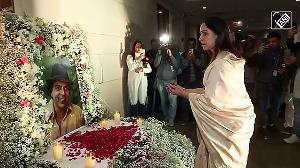
Kiran Mazumdar-Shaw should have been afraid. Every day for three months in 1985 she waded through a crowd of angry employees to get to her office at Biocon India, a maker of enzymes in Bangalore. This was her payback for hiring uneducated employees.
After they joined a communist labor union, she retaliated by automating the plant. The crowd outside burned her in effigy.
"I didn't think they'd hurt a woman," she says. But her detractors have certainly tried to hold her back, making it about as tough as possible for a woman to find her way.
Still, over the last two decades Mazumdar-Shaw, now 51, has turned a small enzyme manufacturer into one of India's premier tech companies. It netted $30.5 million on revenue of $122 million for the fiscal year ended Mar. 31.
Her 40 per cent stake in the company is worth $480 million, making her the richest woman in India. The daughter of a brewmaster and a stay-at-home mom, Mazumdar-Shaw grew up in a progressive, middle-class family, which encouraged her to pursue an education instead of an arranged marriage.
She returned to India in 1975 after getting a B.S. in zoology at the University of Bangalore and an M.S. in brewing from Ballarat College in Australia, expecting to have to fend off job offers. No one would hire her.
"It was too rough a job for a woman," she recalls being told. After consulting for two years, she got lucky after being approached by Leslie Auchincloss, the then owner of Biocon Biochemicals, an Irish specialty chemicals company that had been trying to break into India.
Foreign ownership was limited to 30 per cent, and Mazumdar-Shaw seemed an ideal partner. "She was so focused and had such a forceful personality that I knew she could hold her own," recounts Auchincloss.
Biocon India started out with $10,000 and a plan to produce enzymes for beer, wine, paper, animal feed and detergents. It wasn't a glass ceiling that Mazumdar-Shaw ran into but a concrete one.
It took her weeks to rent space because landlords thought she wouldn't be good for the rent. She couldn't find anyone willing to work for her, so she begged a female friend to fill in as a secretary.
Bankers turned down her request for a $10,000 line of credit; she got the money only after meeting a banker at a friend's wedding. Her first accountant, a man, left as soon as another job opened. By far the worst treatment came from raw-materials vendors who insisted she bring in a male manager if she wanted their wares.
By the late 1980s Biocon India was a profitable concern that was pulling in $1 million a year. Auchincloss sold his 30 per cent interest to Unilever. Mazumdar-Shaw kept her 70 per cent and stayed on, but occasionally chafed under British (and Dutch) rule.
"If I wanted to take a certain action, I had to apprise them, then meet with the other managers before I could make a move," she complains. She reclaimed some autonomy by founding Syngene, a drug services research outfit--which provided early-stage development for drug companies--as a separate company.
After India relaxed its foreign ownership rules, Unilever tried and failed to buy Mazumdar-Shaw's stake. In 1997 the food giant sold its specialty chemicals division, which included Biocon, to Imperial Chemical Industries. ICI had no interest in drug research and a year later was willing to let its slice of Biocon go for $2 million, on the condition that it be supplied with enzymes for two years.
Mazumdar-Shaw came up with the money by persuading her husband, John Shaw, a former textile executive, to sell his London home and join Biocon. (Now he's in charge of international business development and owns 25% of the stock.)
Newly liberated, Mazumdar-Shaw ventured beyond enzymes into insulin production. In this detour Biocon was reversing the dance steps of the Danish insulin firm Novo and making good use of the fermentation expertise it already had. A huge market was right outside its doors--the 32 million Indians with diabetes.
From insulin Mazumdar-Shaw could branch into other drugs for the Indian market; and from India, into the US The new line of business demanded capital. By this time Mazumdar-Shaw had enough name recognition to be able to raise the cash less painfully: $3 million for a 15 per cent equity share came from ICICI Ventures (no relation to ICI), and $5 million came from banks as loans at 10 per cent to 12 per cent interest. She also put in $3 million from retained earnings.
"We bet the bank," she recalls. "If it failed, it would bankrupt the company." After the 2001 patent expiration on lovastatin, one of the earliest cholesterol blockers, Biocon got permission from Indian regulators to sell the generic in India. That was a warm-up.
In 2001 Biocon became the first Indian company to get US Food & Drug Administration permission to sell lovastatin in the US. Now it has 50% of the US market for the copycat version.
Not content to be a star in generics, Mazumdar-Shaw now has 600 scientists doing research to develop the company's own patented drugs.
Biocon has two compounds in clinical trials in India: a monoclonal antibody to treat head and neck cancers, now in Phase II, and a recombinant insulin, in Phase III. (A second monoclonal antibody to deal with rheumatoid arthritis has yet to go to trial.)
Helping to fuel that R&D budget, $16 million a year, is the $70 million Biocon banked when it went public last April. There will be a flood of money coming in from America, as well.
As US drug development costs soar, pharmas are looking to India, where expenses from molecule to market can run 80% less.
Partnerships with seven of the largest US and European pharmaceuticals--in drug discovery and clinical trials--now account for 15% of Biocon's top line.
Photo: AFP / Getty Images
Design: Rahil Shaikh





